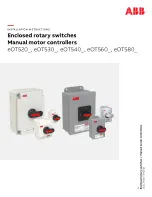
4. Internal Switching Fabric > Packet Queuing
99
Tsi578 User Manual
June 6, 2016
Integrated Device Technology
www.idt.com
4.4.3.5
Transaction Error Acknowledge (TEA)
A Transaction Error Acknowledge signal is implemented in the ISF request queue to control the time a
packet can be at the head of the request queue. When an ingress packet at the head of the request queue
sends a request to the ISF, a timer is started to keep track of the request time. If the timer value reaches
a customer programmable threshold due to congestion at the destination port (defined in TEA_OUT bit
in the
“Fabric Control Register” on page 380
), the TEA interrupt is asserted (maskable by
TEA_INT_EN in
“Fabric Control Register” on page 380
“Fabric Interrupt Status Register” on
). The packet is removed from the request queue to free up space for ingress traffic and the
transaction is deemed incomplete. The TEA error can also be reported back to the host by a port-write.
When there is re-ordering in the request queue, the TEA timer is reset and counting starts with the new
head-of-queue packet.
4.4.4
Input Queuing Model for the Multicast Work Queue
The multicast work queue accepts packets from all of the ingress ports. The multicast work queue does
not accept packets from the broadcast buffers.
The multicast work queue accepts packets based on strict priority, as described in
Multicast Engine Ingress Port” on page 117
. Any priority N packet is accepted before packets of
priority N-1. Within each priority, the multicast work queue uses the round robin algorithm.
The multicast work queue operates in strict First-In, First-Out (FIFO) order and has no watermarks
associated with it.
The multicast work queue always allows packets to cut-through to the broadcast buffer. Refer to
for more information.
4.4.4.1
Multicast Work Queue Ingress Flow Control
Unlike the ingress port and egress port queues, the multicast work queue operates as a bounded buffer.
Packets can begin at any point within the bounded buffer. For more information on the operation of the
multicast work queue, refer to the Multicast chapter (see
The multicast work queue has space for up to seven maximum sized (276 byte) packets, or 245
minimum sized (8 byte) packets.
The multicast work queue ingress arbitration operates on the following two rules:
•
If there is not sufficient space for a maximum sized (276 byte) packet to be received, all ingress
ports are signalled that no packets can be accepted by the multicast work queue.
•
If there is sufficient space for at least one maximum sized (276 byte) packet to be received, all
ingress ports are signalled that packets of any priority can be accepted by the multicast work queue.
Port-Write due to TEA can be disabled by either writing 1 in the PW_DIS bit in the
(which also turns off other port-writes), or by disabling the
TEA interrupt generation by writing a 0 to the TEA_EN bit in the















































